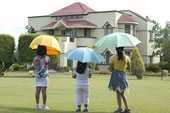Electrical Safety Tips For Apartment
Electrical shock and fire are the major hazards associated with electricity.The effect of the shock may range from a slight tingle to severe burns or cardiac arrest. Electric shocks also occur due to leakage, damage or faults in electrical appliances. Proper safety measures helps to avoid fatal accidents and keep your family safe. The following tips helps you to keep your apartment and family safe and avoid electric shock.
Tips to avoid Electric shock
 |
 |
- Disconnect the power source: Never put extension cords under carpet or rugs as it causes short- circuit. Disconnect the power source before taking up electrical repair work. In case of fire from electrical circuits, switch off the supply immediately and use sand, carbon dioxide or dry powder extinguishers. Do not use water.
- Replace electrical cord: Check your electrical appliance and its cord at regular interval. Replace frayed or damaged electrical cord before it cause any fatal accidents. All electrical cords should have sufficient insulation to prevent direct contact with wires.
- Limit extension cords: Never overload extension cords with too many wires. Limit the use of extension cords or request installation of a new electrical outlet. It is important to check all cords before each use. Keep all extension cords out of high traffic areas.
- Unplug appliances: Unplug appliances after use and when going to bed in night. Unplug any appliance that begins to smell funny or produce smoke.Never use any appliance that has any exposed wires.
- No Flammable Materials: Never keep flammable materials near your electrical appliances. It is a good idea to keep materials such as these outside or in a garage area. In areas where volatile flammable materials are used, motor-driven electrical equipment should be equipped with non-sparking induction motors or air motors.
- Avoid Wet Walls: Current or more shock occurs whenever naked electric wire touches the wet wall either due to ignorance or due to any fault. Switch off power in the portion where the water is likely to come in contact with electrical wire. Change naked wires with proper insulated wire or apply proper insulation over naked wire.
Disconnect the power source, if anyone comes in contact with a live electrical conductor, do not touch the equipment, cord or person. Once the victim has been separated, check to see if he is breathing. If breathing has stopped or seems slow, administer Cardiopulmonary resuscitation (CPR) immediately. CPR is essentially mouth-to-mouth respiration coupled with chest compression. CPR is used on people in cardiac arrest or if breathing has stopped in order to oxygenate the blood and maintain a cardiac output to keep vital organs alive. Call for emergency medical attention as soon as possible.
Many electrical devices have high voltage or high power requirements, carrying even more risk. The effect of the shock may range from a slight tingle to severe burns to cardiac arrest. Disconnect the power source before servicing, repairing electrical equipment. Use three-prong plugs as this substantially reduce the possibility of accidents, especially when used in combination with other safety measures. Use Safety-proof plugs to cover electrical outlet in your home and unplug appliances after use. These safety measures helps to avoid fatal accidents and keep your family safe.
Need to Connect with the Right Electrical Maintenance Companies? click here.







